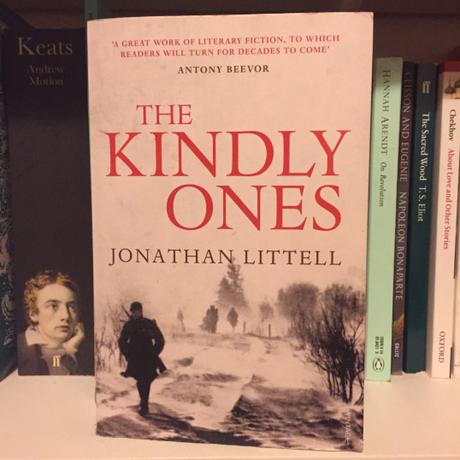In brief, this is the story of a man who was once a Nazi officer, a story of his war; it is a fictional autobiography of an intellectual thrown into the horror of the Second World War. It is the War from 'the other side'. But it is so, so much more than that.
Dr Max Aue is an intellectual, a successful businessman; and he used to be a Nazi officer. In his introduction he states that he intends to 'set the record straight' and that is why he decides to tell his story, but there may be other reasons in play. At times he is brutally frank about what he saw, or did, or was involved with, and one cannot deny the catharsis of a confession.

The detail of the historical research in The Kindly Ones is astounding. Jonathan Littell spent five years researching and a year writing, and it shows. The real characters, that we know from history, are well rounded and chime with historical accounts (particularly Himmler and Eichmann). The depth of detail displays the bureaucracy, internal politics, and conflicts within the Nazi party that affect so much of what happens during the War. Once you have read about the grim reality of the victims, it is fascinating to gain this perspective into the Nazi regime. As in Eichmann in Jerusalem, we learn of the inner workings and day-to-day events that make the Party seem almost like a business or a manufacturer. As Max rises within the Party and is privy to more and more of its inner workings, we see that the suffering of the victims is often viewed as a byproduct of the industry the Nazis create.
Max himself is a Freudian nightmare; self-obsessed, filled with self-loathing, fixated on bodily functions and the intricacies of his family relationships. He relates his dreams, analysing them a little and leaving the rest to us. He in an intellectual dragged into a bloody war between what might be good and what might be evil, and he hates both himself and everyone else around him. He is repulsed by human suffering, but also by his own actions. It is unsurprising when he gets ill or has a mental breakdown (both happen more than once).
I could spend a lot of time and words analysing Max and his own unique brand of crazy. He is a deeply real character, a terrible and brilliant person, and you both hate him and love him, mostly out of pity. I greatly admire Littell for his commitment to his creation.
The Kindly Ones is heavy going, not only for its subject matter and the intensity of Max's narrative, but also because it is over 900 pages long. But, if you have the interest in the history, as well as the philosophy and psychology (there is a lot of both) then it is well worth the time and effort. Like Max, it is terrible and brilliant, and crazy in its own way. My only real criticism is that it was obviously translated by an American and so there is some American phrasing, which is a bit jarring because Max is European, and I, the reader, am English. But really this is insignificant.
I can't tell you how wonderful this book is. It is not something to be taken lightly, but it is its own kind of masterpiece.
*
Originally published as Les Bienveillantes in France in 2006 by Editions Gallimard; then in English in 2009 by Chatto & Windus. I read the 2010 paperback published by Vintage (pictured above).
Buy your copy from Foyles here.
After you've read it I would recommend getting some background on the Wikipedia page (lots of excellent Greek mythology).
